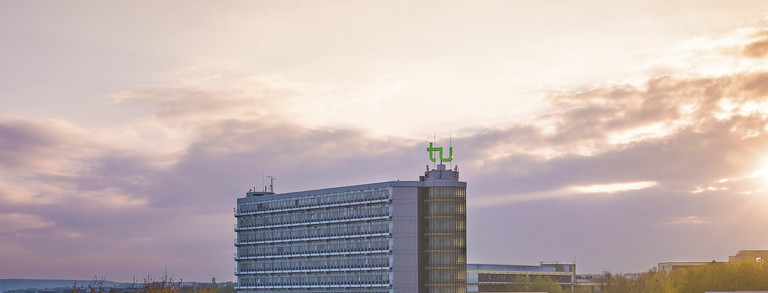Three questions to the founding dean of the Faculty of Social Sciences
- Research
- Top News
- Studying & Teaching at TU Dortmund University

Despite the coronavirus crisis, work at TU Dortmund University continues – and since the start of the month even with its new addition in the shape of the Faculty of Social Sciences. Professor Nicole Burzan is the faculty’s founding dean and describes a modicum of normality at the University during the pandemic.
Congratulations on your new role, Ms. Burzan: You’re the freshly appointed dean of the new Faculty of Social Sciences. How was it possible to set up the seventeenth faculty during a period when students are not allowed to set foot in the University’s buildings and its staff is mostly working from home or on call?
The Rectorate presented the idea for setting up the new faculty in October 2019 and then approved it at the end of January 2020. This gave us a certain amount of time until the official inauguration, during which the professors involved held a meeting and already developed some first ideas, for example, on the planned sociology degree program, the new professorships, and much more besides. Our working groups can now continue their work by means of digital channels. In addition, there’s a team in administration that is providing excellent help in setting up the faculty, especially in these difficult times.
As long as there is still no Faculty Council, it’s a large number of people from different areas who are getting first things moving. Like all the other faculties, we’ll elect our Faculty Council in June. We’ve already designed a faculty logo that also appears on our new website. And this is how we’ll continue until we become a “normal” faculty with elected bodies as soon as possible – insofar as anyone can speak of normality right now. We’ll be teaching courses in the summer semester in those degree programs in which we’ve so far been integrated, and we’ll likely get in touch with our students first of all via digital media.
What distinguishes the new faculty?
Firstly, the new faculty brings together fields of sociology that along with the Social Research Center (sfs – Sozialforschungsstelle) cover very wide-ranging analysis and reflection in respect of central topics of social change. These include, for example, aspects related to work, technology and social innovation, but also life in ageing societies in the context of complex social inequalities – depending on class affiliation, gender and ethnic origin. Such topics offer an opportunity to take a look both at more fundamental phenomena – such as the conditions and effects of digitalized work – as well as to explore quite contemporary issues.
A specific topic, for example, is how older people are dealing with social distancing and risk of infection. In this context, the faculty not only covers a wealth of topics but also theoretical and methodical approaches, which is undoubtedly one of its most distinctive features.
Secondly, three professorships from the Institute for Interdisciplinary Didactics come under the faculty’s umbrella, which provide, among others, the expertise needed for the social science teaching degrees. Together, we’re already very strong in research and expect to tap further potential by merging together as a faculty and to enhance our visibility as an important place for sociology teaching and research.
What perspectives do you see for the faculty?
One perspective concerns support for the next generation: With an additional undergraduate degree program in sociology, we can dovetail research and teaching even better. We can offer an interesting course portfolio with international elements and in so doing so better support the next generation of academics.
Other perspectives naturally focus on research. Sociology – for which I as a sociologist can best speak here by way of example – is a reflexive science. It not only explores short-term solutions for social problems but also takes a step back and thinks about what values and balances of power are connected, for example, with certain processes, strategies or courses of action. These can be related to migration or climate change, for example. This reflexive knowledge is becoming more and more important – in society but also in interdisciplinary research contexts. We’ll use our faculty status to make our strengths in these research fields more visible. Apart from existing partnerships, we’re going to work with new partners at the University and in the region, but also at international level.
About Nicole Burzan:
Nicole Burzan was appointed professor at TU Dortmund University in 2007. She holds the chair for Sociology and Social Inequalities. She previously worked at the FernUniversität in Hagen (Germany’s State Distance-Learning University) as a research associate and junior professor. Her work in Dortmund centers on social inequalities from the perspective of cultural sociology (e.g., status reproduction in the middle class, inequality aspects in museums, sociology of time) as well as linkage methods in empirical research. From 2017 to 2019 she was chairwoman of the German Sociological Association (GSA).




![[Translate to English:] Partner Four hands are holding the green logo of TU Dortmund University](/storages/tu_website/_processed_/1/d/csm_Partner_Nicole_Rechmann_KW_40b35bb3fd.jpg)




![[Translate to English:] Forschung An apparatus with tubes in a laboratory](/storages/tu_website/_processed_/0/c/csm_Forschung_Juergen_Huhn_cbd34afd6d.jpg)
![[Translate to English:] Studium Five students are sitting in a lecture hall. They are talking to each other.](/storages/tu_website/_processed_/c/9/csm_Studium_FelixSchmale_81d94adc86.jpg)






